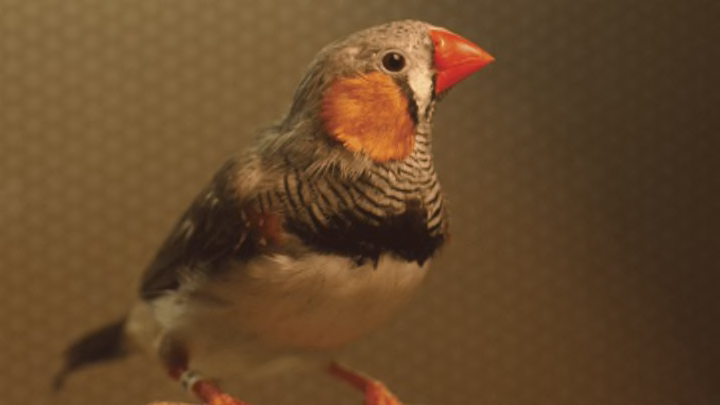Baby talk is kind of like inside jokes: maddening to anybody outside of the conversation. Yet despite widespread loathing, baby talk persists across cultures—and possibly even species. A new study found that adult zebra finches speak differently to baby birds than they do to one another, and that this “baby talk” seemed to help the young birds learn to sing. The research was published in the Proceedings of the National Academy of Sciences.
Researchers brought in young zebra finches and placed each one in its own chamber. Half of the birds then spent a few days with adult finches, one adult per juvenile. The other half stayed alone in their box, into which the researchers played pre-recorded song from adult finches. After these “tutoring sessions,” as the researchers called them, the older birds and piped-in song were removed, and the young birds were left on their own to develop as usual. When the young birds reached maturity, the researchers recorded their songs and compared them with those of their tutors.
Another set of young birds were divided into three groups for roughly two-hour sessions: one group met with a live tutor; another listened to canned birdsong, and a third listened to nothing at all. After the tutoring sessions had concluded, all of the birds were euthanized so the researchers could examine their brains.
From these experiments, the researchers learned several interesting things. First, they found that adult birds sang different songs to little birds than they sang to themselves. Those songs were slower and more repetitive, and their notes were typically higher and more variable in pitch. The directed song, as you can hear for yourself, is pretty much baby talk.
The results also showed that young birds who listened to this baby talk—that is, who were addressed directly, or socially, by their tutors—fared better later on than those who listened to regular, or passive, adult birdsong from a recording.
McGill University neurobiologist Jon Sakata was lead author on the paper. "Songbirds first listen to and memorize the sound of adult songs and then undergo a period of vocal practice—in essence, babbling—to master the production of song," he said in a press statement.
Finally, they found clear differences between the brains of socially and passively tutored birds. Birds that had had a chance to listen to baby talk showed more activation in neurons in the midbrain that help produce dopamine and norepinephrine, two chemicals which may help with retaining information.
Although the study only concerned finches, Sakata said the results may have implications for people, too: “Our data suggest that dysfunctions in these neurons could contribute to social and communicative disorders in humans.”
